by Gary Lord
Home - Genesis - 2007 - 2008 - 2009 - Early 2010 - Mid 2010 - Late 2010 - End 2010 - Early 2011 - Mid 2011 - Late 2011 - End 2011 - Early 2012 - Late 2012 - Early 2013- Late 2013 - 2014 - 2015 - Early 2016 - Late 2016 - 2017-19
Chapter Seven: Late 2010
Fame v. Anonymity
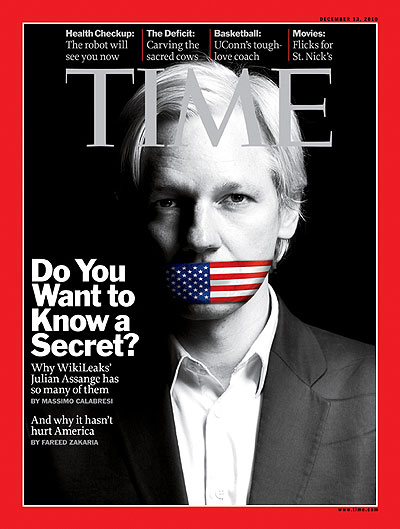
By the end of 2010 Julian Assange had become a major global celebrity, topping the popular vote for TIME’s Person of the Year award (the editors gave it to Facebook founder Mark Zuckerberg instead). But some argued that the unresolved sex allegations hanging over him were causing undue damage to WikiLeaks' reputation. In a late 2010 online Q & A session, Assange was asked: "Don’t you think it would be better if the organization was anonymous?"
"I originally tried hard for the organisation to have no face, because I wanted egos to play no part in our activities. This followed the tradition of the French anonymous pure mathematians, who wrote under the collective allonym, "The Bourbaki". However this quickly led to tremendous distracting curiosity about who and random individuals claiming to represent us. In the end, someone must be responsible to the public and only a leadership that is willing to be publicly courageous can genuinely suggest that sources take risks for the greater good. In that process, I have become the lightening rod. I get undue attacks on every aspect of my life, but then I also get undue credit as some kind of balancing force."
Following the release of the Afghan War Logs on 26 July 2010, Assange told a packed audience at the Frontline Club:
"We started off like the Economist. We wanted to make the news, not be the news. But that produced extraordinary curiosity as to who we were… This attempt not to be the news, made us the news."
Two days later the Rupert Murdoch-owned UK Times newspaper demonstrated Assange’s point, with an article that falsely implied he was personally responsible for the recent death of an Afghan man. A front page headline screamed: "Afghan leaks expose the identity of informants". The paper claimed to have discovered the names of dozens of Afghan informants with just "two hours of searching the Wikileaks archive". Julian Assange was incensed by this "bullshit", but the page 13 story was particularly deceptive.
There’s a photo of Assange below a headline that reads "Taliban hitlist' row: WikiLeaks founder says he did right thing". And next to the photo, another headline reading "Named man is already dead." The imputation is quite clearly that Assange’s actions have resulted in the man’s death, although in the story itself it makes it clear that he actually died two years ago.
In fact, Times readers had to absorb six paragraphs of information before discovering that the man had already been dead for two years. This "yellow journalism" was a sign of things to come. Journalists continued putting Assange on the defensive with unsubstantiated claims about allegeged or merely "possible" casualties. They haughtily pressured him to defend the "morality" of WikiLeaks' actions.
"You have to start with the truth," argued Assange. "The truth is the only way that we can get anywhere. Because any decision-making that is based upon lies or ignorance can’t lead to a good conclusion."
He said WikiLeaks was "creating a space behind us that permits a form of journalism which lives up to the name that journalism has always tried to establish for itself". But how many other journalists and media organisations wanted to inhabit that space?
Guardian editor David Leigh, who later became one of Assange’s harshest critics, said it was "actually fairly irrelevant to talk about whether what Julian is doing is a bad thing or a good thing, because if he wasn’t doing it, somebody else would".
"He’s a function of technological change. It’s because the technology exists to create these enormous databases, and because it exists it can be leaked. And if it can be leaked, it will be leaked."
This was very much the philosopy of a rapidly growing online collective of hackers, united under the hashtag #Anonymous, who were proliferating on social media and already strong supporters of WikiLeaks:
"Information wants to be free".
*
On 6 August the US Pentagon demanded WikiLeaks delete all published classified documents and return any other classified files in their possession.
If doing the right thing is not good enough for them then we will figure out what alternatives we have to compel them to do the right thing.
On 21 August 2010 the Wall Street Journal reported that Pentagon lawyers believed WikiLeaks had "acted illegally" in publishing the Afghan War Logs, and federal prosecutors were "exploring possible criminal charges". An anonymous US law-enforcement official said the joint investigation by the Army and the FBI was "still in its early stages" and Julian Assange had "not been identified by the FBI as a target of the probe". However:
Several officials said the Defense and Justice departments were now exploring legal options for prosecuting Mr. Assange and others involved on grounds they encouraged the theft of government property.
One big issue - dubbed "the New York Times problem" - was already evident: charging Assange would equate to criminalising journalism.
Bringing a case against WikiLeaks would be controversial and complicated, and would expose the Obama administration to criticism for pursuing not just government leakers, but organizations that disseminate their information.
The investigation, formally known as the Information Review Task Force, was lead by Brigadier General Robert Carr of the Defence Intelligence Agency (the Pentagon’s equivalent of the CIA) under the direction of the Secretary of Defense Robert Gates.
In a nondescript suite of government offices not far from the Pentagon, nearly 120 intelligence analysts, FBI agents, and others are at work — 24 hours a day, seven days a week — on the frontlines of the government’s secret war against WikiLeaks.
The "WikiLeaks War Room" was tasked with investigating "exactly what classified information might have been leaked to WikiLeaks", and then predicting how disclosure of such information could affect the US military or US foreign policy. But also, more ominously:
The team has another distinct responsibility: to gather evidence about the workings of WikiLeaks that might someday be used by the Justice Department to prosecute Assange and others on espionage charges.
*
As every psychologist knows, people react very differently - and sometimes very strangely - when placed under immense pressure. As threats mounted year after year, Julian Assange gradually found himself at war with the most powerful forces on earth. And it was very much a war-like situation, with Assange’s friends, family, colleagues, lawyers and supporters were all targeted. By November 2010, US Secretary of State Hillary Clinton was reportedly complaining: "Can’t we just drone this guy?"
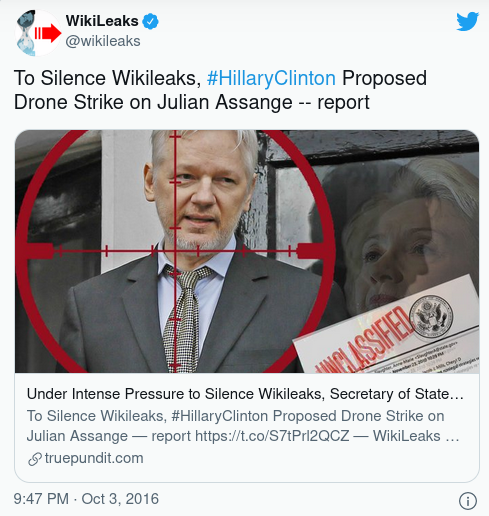
According to State Department sources at the early morning meeting of "top brass":
The statement drew laughter from the room which quickly died off when the Secretary kept talking in a terse manner, sources said. Clinton said Assange, after all, was a relatively soft target, “walking around” freely and thumbing his nose without any fear of reprisals from the United States.
Clinton later refused to deny her reported comments: “It would have been a joke, if it had been said, but I don’t recall that."
Faced with ever-escalating pressure and associated dangers to his own life, Assange continually hardened his resolve. As Vaughan Smith, the director of the Frontline Club, put it: "Combat, intellectual combat, seems to be his stimulant of choice. It just fuels him."
There may be an element of Aspergers Syndrome in such stubbornly single-minded persistence. Or Julian Assange may simply be a courageous hero in the mould of Daniel Ellsberg and other great truth-tellers. Perhaps a bit of both. Others at WikiLeaks, however, did not respond to the constantly mounting pressure with such steely determination.
Staff Defections
On 26 August 2010 Newsweek published an article with the ridiculous title: "Is WikiLeaks Too Full of Itself?" The article cited "a person in close contact with other WikiLeaks activists around Europe, who asked for anonymity".
Insiders say that some people affiliated with the website are already brainstorming whether there might be some way to persuade their front man to step aside, or failing that, even to oust him.
Assange suspected a mole within his organisation. He confronted Daniel Domscheit-Berg, who had appeared on stage alongside him at the Chaos Computer Club in 2008. Domscheit-Berg had changed his surname from Berg (also sometimes using "Daniel Schmitt") a few months earlier, after marrying Anke Domscheit, who was then the head of government relations for Microsoft Germany (according to WikiLeaks) and later became a German MP. Guatemalan lawyer and human rights activist Renata Avila, who had stayed at Mr. Domscheit-Berg’s home in Wiesbaden, Germany for a week in 2009, later noted that "his enthusiasm, his interest and priorities regarding WikiLeaks changed significantly" after his marriage. When she asked how she could help Chelsea Manning "he did not appear to be interested". When she sent information to assist Manning "he never followed it up".

In a heated online exchange that was later leaked to WIRED magazine, Assange demanded to know if Domscheit-Berg was the source of the Newsweek article and probed him for information on his other contacts. Domscheit-Berg criticized Assange’s management and complained that redactions were being rushed, while refusing to answer Assange’s questions. Unhappy with such responses, Assange declared:
"You are suspended for one month, effective immediately."
Soon afterwards, Domscheit-Berg told Der Spiegel he was leaving WikiLeaks. Herbert Snorrason, an Icelandic university student, also departed after challenging Assange’s decision to suspend Domscheit-Berg. Assange reportedly snapped at him:
"I am the heart and soul of this organization, its founder, philosopher, spokesperson, original coder, organizer, financier and all the rest. If you have a problem with me, piss off."
WIRED claimed that "at least half a dozen WikiLeaks staffers" had resigned by the end of September 2010, including "a key WikiLeaks programmer [who] was responsible for building the software tool WikiLeaks' volunteers were using to perform a painstaking, line-by-line harm-minimization review of the Iraq logs". WikiLeaks tweeted that they "remained strong" and "no resignations have been tendered." But the damage stemming from these departures would be long lasting.
In August 2011 Julian Assange announced that Daniel Domschiet-Berg had "managed, through guile, to convince a German WikiLeaks system administrator, who was an old associate of DDB’s, to obtain the keys and data for a large quantity of then pending WikiLeaks whistleblower disclosures". He said the WikiLeaks submission system had been "sabotaged". And Renata Avila revealed that she had given Domschiet-Berg "some documents detailing proof of torture and government abuse of a Latin America country".
The documents were only in hard copy. I entrusted those valuable documents – the only copy available – to Wikileaks because of the expertise of the people running it, their procedures and the mechanisms they used to maximize impact when published. I did not intend to give such material to Mr. Domscheit-Berg personally, as was made clear to him by me at the time. My intention was to give it to the platform I trusted and contributed to; to WikiLeaks.
The loss of valuable data was not the only problem WikiLeaks faced. Anonymous "former WikiLeaks insiders" quickly became a regular source of commentary for journalists writing anti-WikiLeaks articles. Domschiet-Berg quickly published a book, "Inside WikiLeaks: My Time with Julian Assange at the World’s Most Dangerous Website". It sold poorly but Steven Spielberg’s Dreamworks Studios nevertheless bought the rights in 2011 and partly based a misleading 2013 movie on it. In December 2010 Domschiet-Berg and Snorrason announced a rival "leaks" site called OpenLeaks, to much media acclaim; it disappeared after Domscheit-Berg admitted he had destroyed the files taken from WikiLeaks. These files apparently included WikiLeaks' only other copy of the US Military’s Garani massacre in Afghanistan, and 5GB of data from the Bank of America.
*
Despite these setbacks, WikiLeaks continued growing more popular and influential. By September 2010, "copycat" leaking sites were appearing around the world and over 250 books had apparently been published based on WikiLeaks revelations. The UK’s New Statesman magazine listed Assange in their top 50 world’s most influential people for 2010. On 26 September 2010, the day before Julian Assange left Sweden, WikiLeaks tweeted: "Successfully completed our next three films. Thank you team and supporters."
A viral video in late July 2010, WWWar on the Internet from Rap News - a group of young Melbourne-based activists - was indicative of WikiLeaks' widespread public support at the time. An Assange impersonator rapped:
"The site’s purpose is to provide a safe haven / In the new dawn of information, documentation, / whistle-blowing, bell-ringing, all of this / you can lick it using our unique technologies."
Three months later the Rap News War on Journalism video featured Julian Assange himself, unmasking his impersonator. By October 2021 this video had over a million views.
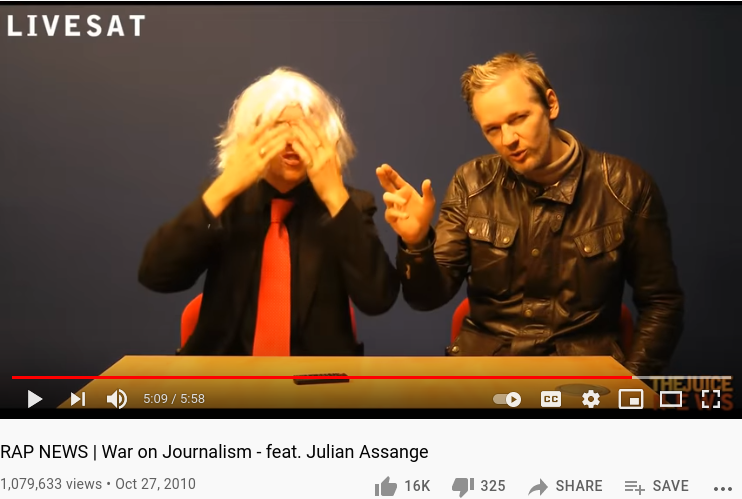
*
Increasing popularity meant increasing public donations, which remained WikiLeaks' only means of financial support. But on 13 August 2010, the UK-registered internet payment company Moneybookers, which collected donations for WikiLeaks, advised them that their account was being closed. The decision was made less than a week after the Pentagon’s public threats of reprisals against WikiLeaks. Moneybookers, which later rebranded as Skrill, revealed that the WikiLeaks organisation had been added to government blacklists in Australia and the USA.
On 14 October WikiLeaks accused the US government of ‘financial warfare’. Assange’s bank accounts had already been frozen when he was in Sweden, and in September 2010 Facebook had frozen the 10,300 strong Bradley Manning Support Network, which hosted a Defence Fund for the accused whistle-blower.
With rumours growing of a huge upcoming leak of US data from Iraq, staff at the Pentagon were also under pressure. In Washington DC, James Clapper, the Obama administration’s new Director of National Intelligence, told a conference on intelligence reform that the President was full of "angst" over the "hemorrhage" of leaks of sensitive intelligence from government officials.
Citing the WikiLeaks release, Clapper said that intelligence agencies would have to be more restrained about sharing information as a result.
On 18 October the Pentagon warned news organizations not to publish classified US documents that were "due to be released by WikiLeaks". A spokesman said “news organizations should be cautioned not to facilitate the leaking of classified documents with this disreputable organization known as WikiLeaks.” Reuters reported that US officials were "braced for a mass disclosure of leaked Iraq war files".
WikiLeaks, which in July released some 70,000 U.S. documents on the Afghanistan war, is expected soon to post on its website as many as 500,000 classified leaked U.S. documents from the Iraq war.
Over seven hundred articles about the imminent release were published around the world. There was just one problem with the story: it was not true.
As WikiLeaks later tweeted, newspapers and newswires all over the world had been "fooled by a tabloid blog - and each other". And that blog was from WIRED magazine.
Wired’s blog is not just any source that lacks credibility. It is a known opponent and spreader of all sorts of misinformation about WikiLeaks. This dramatically ramped up since we demanded an investigation into what role they played in the arrest of the alleged journalistic source, US intelligence analyst, Bradley Manning.
Rixstep News provided a short list of "the more prominent idiots who hopped on the bandwagon on the basis of a single source of highly dubious value":

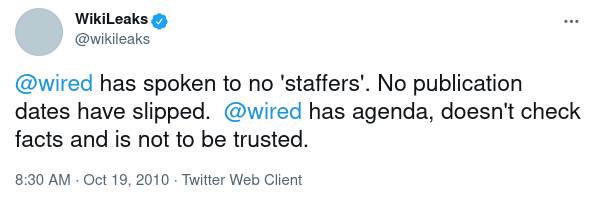
*
The next day, network security analyst Nadim Kobeissi wrote that WikiLeaks revelations had "turned the Internet into a war zone". He predicted that the outcome of their battle with US authorities would "change the face of the world".
On one side, WikiLeaks has assembled the brightest and most dedicated hacker-activists in an effort to turn the Internet into a bastion of transparency and information freedom.
On the other side, the United States has combined its Department of Defense, Federal Bureau of Investigation, National Security Agency in an attempt to clamp down on the Internet with censorship and encryption-banning laws… Unlike the Internet, the U.S. has rulers, and those rulers aren’t yet accustomed to how the people of the Internet see knowledge as free. In fact, they are threatened by it.
Kobeissi said the USA now found itself "punishing the truth-speaking and fighting those who stick by their own motto of truth and bravery." He called it "a battle of applied ethics: information transparency versus the ideal that some are more fit to know than others."
There is no question that the side that will win this ethical battle will be the one to define, at least for the coming decade, if information transparency is nurturing or destructive.
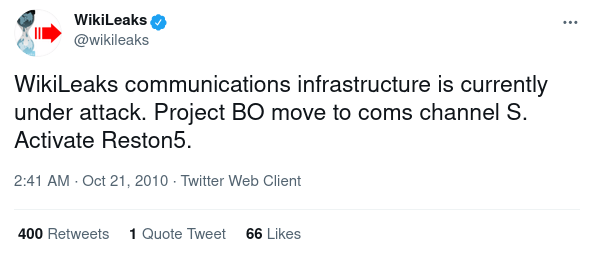
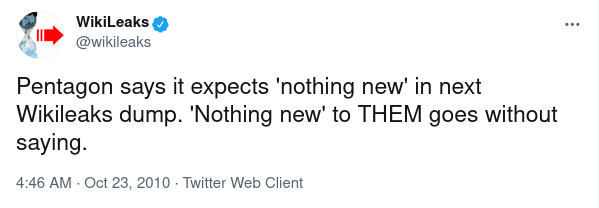
*
Iraq War Logs
In the end it was Democracy Now! who got the exclusive story on the upcoming leak, including an interview with Daniel Ellsberg, just before he jumped on a plane to London, where he appeared on stage with Julian Assange at the 23 October 2010 press conference. Ellsberg said he was "quite jealous" of WikiLeaks' technical capabilities, noting that he had to manually Xerox 7,000 pages in 1971 - "and I couldn’t have done what I did ten years before that."
"But I’m glad to express my support of what WikiLeaks is doing and its sources, in particular. Whoever gave this information to WikiLeaks obviously understood that they were at risk of being where Bradley Manning is now."
Ellsberg noted that US authorities were "crying alarm over this, as they always do" but they "know what’s coming out".
"I think that one should take their warnings now with a lot of salt… And in terms of blood on their hands, I’m sorry to say, a lot of actual blood has been spilled, as opposed to this hypothetical possible blood, of which none has been reported, from WikiLeaks."
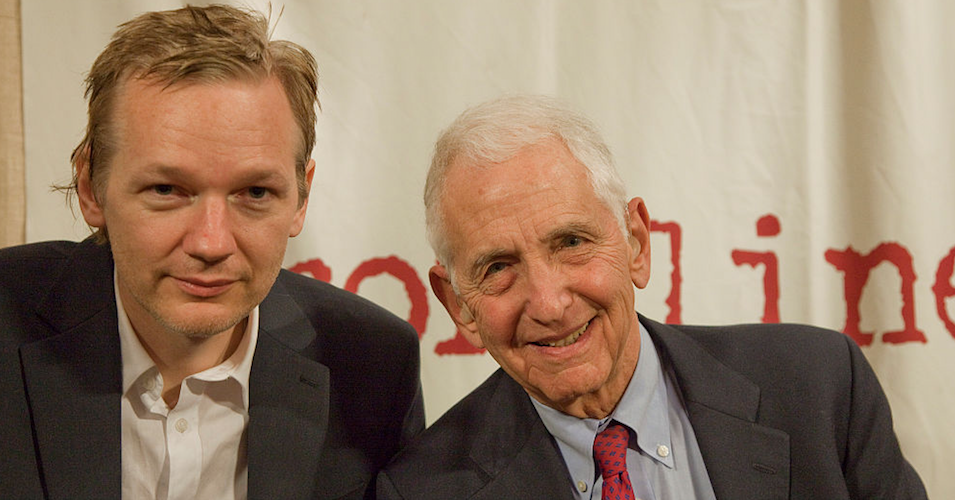
As usual, WikiLeaks sought to maximise attention on their leak, urging supporters to keep an eye on media partners ahead of the release. New media partners included Al Jazeera, Le Monde, the Bureau of Investigative Journalism, and the Swedish public broadcaster Sveriges Television (Al Jazeeera broke the agreed embargo by releasing stories 30 minutes early). WikiLeaks also published a lengthy statement to help media avoid factual mistakes:
WikiLeaks has a history breaking major stories in major media outlets and robustly protecting sources and press freedoms. We have never revealed a source. We do not censor material. Since formation in 2007, WikiLeaks has been victorious over every legal (and illegal) attack, including those from the Pentagon, the Chinese Public Security Bureau, the former president of Kenya, the Premier of Bermuda, Scientology, the Catholic & Mormon Church, the largest Swiss private bank, and Russian companies.
WikiLeaks pointed readers to the numerous stories being published about the Iraq War Logs, which were eventually published in searchable format at the same WikiLeaks War Diaries page as the Afghan War Diary files.

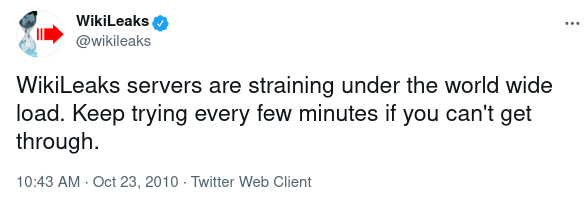
The 391,831 US Army Sigacts (Significant Actions) from Iraq - then the largest leak of classified military material in history - revealed that civilian casualties were much higher than previously estimated. US General Tommy Franks famously told a reporter "we don’t do body counts" but that turned out to be a lie. The non-profit Iraq Body Count project had to add 15,000 more civilian deaths to their tally. Civilians were routinely killed for coming too close to US military checkpoints and US troops often classified civilian deaths as enemy casualties. Even the two Reuters journalists killed in the Collateral Murder video, along with men accompanying them, were officially listed as "enemy killed in action". Private contractors working with the US military were also routinely killing civilians with no accountability.
The BBC focused on how US forces turned a blind eye to the torture of prisoners by their Iraqi colleagues, "sometimes using electrocution, electric drills and in some cases even executing detainee". One victim had chemicals poured on his hands and his fingers cut off. In another incident, US troops confiscated a "hand cranked generator with wire clamps" from a Baghdad police station. Reports of abuse were sent up the chain of command but then marked "no further investigation".
The Guardian reported that US troops actually handed over Iraqi prisoners to an Iraqi torture squad called the Wolf Brigade, which was created by the US "in an attempt to re-employ elements of Saddam Hussein’s Republican Guard".
The interrogator told the prisoner in explicit terms that: "He would be subject to all the pain and agony that the Wolf battalion is known to exact upon its detainees."
Glenn Greenwald noted how the New York Times deliberately ignored this important story. Instead the USA’s "newspaper of record" prominently featured what Greenwald called "a sleazy hit piece on Assange, filled with every tawdry, scurrilous tabloid rumor about him". The article, titled "WikiLeaks Founder on the Run, Trailed by Notoriety", did at least feature one memorable quote from Assange:
“When it comes to the point where you occasionally look forward to being in prison on the basis that you might be able to spend a day reading a book, the realization dawns that perhaps the situation has become a little more stressful than you would like.”
After the constant criticism about redactions in the Afghan War Logs, WikiLeaks had changed their process for redacting the Iraq data: now all names were replaced or blanked out. WikiLeaks was then accused of "over-redaction", with critics noting that even Pentagon FOIA releases of certain identical documents provided more information.

Once again US officials said the leak of confidential documents was "a tragedy" and "criminal", while also insisting that they revealed nothing of interest.
A US Department of Defense spokesman dismissed the documents published by the whistleblowing website as raw observations by tactical units, which were only snapshots of tragic, mundane events.
US Secretary of State Hillary Clinton again suggested that WikiLeaks "put lives at risk". On FOX news, a former State Department official demanded that President Obama seize Assange and other WikiLeaks staff, then treat them as "enemy combatants".
Calling for "non-judicial action" against them, he implied that they should be in Guantanamo Bay with Taliban inmates.
An editorial in the conservative Washington Times said the US government should be "waging war on the WikiLeaks web presence." Syndicated columnist Jonah Goldberg wrote an article titled “Why is Assange still alive?” and claimed the WikiLeaks leader should have been "garroted in his hotel room years ago.”
The most bizarre headline came from the New York Post, which ridiculously declared: "There were weapons of mass destruction after all"! Of course it was not true:
Closer inspection of passages referring to the discovery of equipment by coalition forces in Iraq reveal they were left over from early efforts by Saddam Hussein to build a deadly arsenal and do not point to his concealing hardware when the invasion was ordered.
Meanwhile the UN High Commissioner and other international organizations called for the new information to be investigated fully, and those responsible for any crimes to be held accountable. In Baghdad, the Iraqi News Network called on Prime Minister Nouri al-Maliki to resign over the shocking revelations:
The WikiLeaks documents revealed very important secrets, but the most painful among them are not those that focus on the occupier, but those that reveal what the Iraqi forces, Iraqi government and politicians did against their citizens. Those leaders who returned to remove Iraq from oppression toppled the dictator but then carried out acts that were worse than Saddam himself.
And in a positive sign of how the media was slowly learning to deal with these huge data dumps, the Guardian published a zoom-able map of Iraq showing each Sigact as a red dot that could be clicked to reveal details.
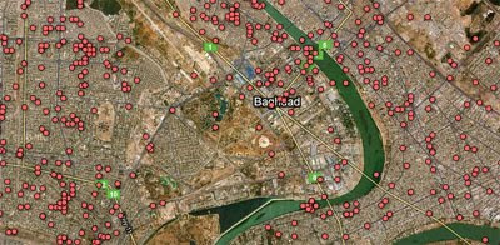
*
Two days after releasing the Iraq War Logs, Julian Assange was recognised with the Sam Adams Award for Intelligence Integrity. The annual award is decided by a group of retired CIA officers and named after Samuel A. Adams, a CIA whistleblower during the Vietnam War. It was an important sign that Assange still enjoyed some support within the secretive US intelligence community.
Soon afterwards, Assange told a Frontline Club audience that WikiLeaks had too much leaked material and not enough funds to manage any more incoming leaks, so they had temporarily closed their submission system. He did not yet reveal his allegations that the system had been sabotaged by former staff because he was still hoping to retrieve the "stolen" material via protracted negotiations.
As the fallout from the Iraq War Logs continued, the USA continued harrassing people connected to WikiLeaks or Chelsea Manning. On 3 November 2010, a 23-year-old MIT researcher named David House got the same US airport treatment as Jacob Applebaum months earlier. Glenn Greenwald reported:
House’s crime: he did work in helping set up the Bradley Manning Support Network, an organization created to raise money for Manning’s legal defense fund, and he has now visited Manning three times in Quantico, Virginia, where the accused WikiLeaks leaker is currently being detained (all those visits are fully monitored by government agents). Like Appelbaum, House has never been accused of any crime, never been advised that he’s under investigation, and was never told by any federal agents that he’s suspected of any wrongdoing at all.
House, who was on Manning’s Facebook friends list at the time of her arrest, said he was told that one of the agents was with the FBI Joint Terrorism Task Force. The FBI denied any involvement. Appelbaum tweeted that after four months his confiscated equipment still had not been returned.
*
The weeks leading up to the 26 November 2010 release dubbed "Cablegate" were incredibly stressful. While the US government was angry about the release of military data from Iraq and Afghanistan, they were far more concerned about the huge cache of US State Department cables - seven times the size of the Iraq War Logs - that they already knew Chelsea Manning had also leaked. They were already discussing it with the New York Times.

On 5 November 2010 WikiLeaks surprisingly tweeted that Assange was seeking asylum in Switzerland. Assange was in Geneva ahead of an historic examination by the UN Human Rights Council of the USA’s sorry record on human rights. He delivered a two hour speech, offering up evidence from the Iraq War logs of human right abuses and torture, and warned that the USA was "in grave danger of losing its way". He urged US leaders to stop their “aggressive investigation” into his organisation and "open up instead of covering up". WikiLeaks later revealed:
During his stay in Geneva the Swiss government was so fearful for his personal security that they offered two International Police and two Swiss Police as his bodyguards for the duration, yet another indication of the severity of the danger he encounters on a daily basis.
While in Switzerland, Assange worked hard to keep WikiLeaks afloat in the difficult weeks ahead. He met with members of the Swiss Pirate Party, whose wikileaks.ch mirror site remained online when the WikiLeaks.org site came under attack a month later. He also opened a bank account through the Swiss postal system in Bern, which provided a temporary route for donations to WikiLeaks: the account was also shut down a month later. WikiLeaks later tweeted that the "US pressured Switzerland to refuse Assange asylum".
In early November 2010 the CIA refused to either confirm or deny plans to assassinate Julian Assange, turning down a Freedom of Information (FOI) request for any related files. Instead CIA Director Leon Panetta publicly announced a full investigation of WikiLeaks revelations and claimed - again without providing evidence - that “in some cases, CIA sources and methods have been compromised, harming our mission and endangering lives." Somewhat ironically, he insisted that such leaks "cannot be tolerated” while releasing an internal CIA memo to the media.
In an internal memo, released to the media Monday, the director said that sharing information “cannot extend beyond the limits set by law and the ‘need to know’ principle. The media, the public, even former colleagues, are not entitled to details of our work.”
Meanwhile, a prosecutor at the International Criminal Court (ICC) declared that the WikiLeaks war logs could eventually be used in a war crimes trial with US citizens in the dock. The UN’s special rapporteur on torture said he hoped to visit Iraq to probe the exposed "widespread practice of torture" and also wanted to visit Guantanamo Bay. And the Danish military apparently asked WikiLeaks for an unredacted version of the war logs, after being rebuffed by the USA.
While Assange’s lawyers urgently appealed against his extradition to Sweden, WikiLeaks pointed to evidence of US spying in Sweden, and the war logs revealed that Swedish weapons were being used by both sides in the Iraq war. Nevertheless, on 20 November 2010 Sweden issued another warrant for the arrest of Julian Assange.
Within 48 hours, journalists around the world united to express their support for Assange and WikiLeaks:
Mr. Assange is no more guilty of espionage than any journalist or any whistleblower. This is a terrible precedent and one that is contrary to open government. If it is espionage to publish documents provided by whistle blowers, then every journalist will eventually be guilty of that crime.
*
While frantic US government officials were struggling to contain the fallout from the war logs, finding new ways to block WikiLeaks activities, and preparing for the next shocking release, New Zealand journalist Nicky Hager was enjoying the "relaxed and friendly" atmosphere inside the secret "bunker" in the Guardian’s London offices.
The atmosphere in that room was far removed from the portrayals of WikiLeaks coming from its critics… Much of the time it was completely silent, apart from typing, as they focused on formatting materials and liaising with media organisations in preparation for the release.
You might imagine a room full of hackers and other shadowy types. But the small inner core of WikiLeaks' workers was mainly journalists and computer specialists: competent, strikingly free of egotism and personal conflict, and very focused on the work that needed to be done.
But it wasn’t all beer and roses. According to a book later published by Der Spiegel’s Holger Stark and Marcel Rosenbach, Assange was angry at the New York Times' earlier "hit piece" (published on their Iraq War Logs front page) and decided to partner with the Washington Post and McClatchy instead. But Guardian editor David Leigh had already (secretly) given the Times a copy of the Cablegate files. And a "rogue" copy of the files had been given to another British journalist, Heather Brooke, by an Icelandic "former WikiLeaks supporter". An urgent meeting of the major media partners was arranged for the first day of November.
The Guardian and the New York Times had already begun concrete preparations in early October to publish the embassy cables without WikiLeaks' consent. Under their plan, WikiLeaks was not to be informed until one or two days before publication. There was even a tentative publication date: Friday, Nov. 5, 2010. Assange had threatened to immediately publish all of the cables online if the two publications went ahead with their plans.
Assange turned up late to the meeting, accompanied by lawyers, and coughing repeatedly due to "stress". Guardian Editor-in-Chief Alan Rusbriger (David Leigh’s brother in law) also summoned a lawyer. Things quickly got messy. Assange pointed to his contract with the Guardian, who in turn pointed to the "rogue" files and suggested their contract was now meaningless. The New York Times, who did not even send a representative to the meeting, claimed the Guardian was now their source, not WikiLeaks.
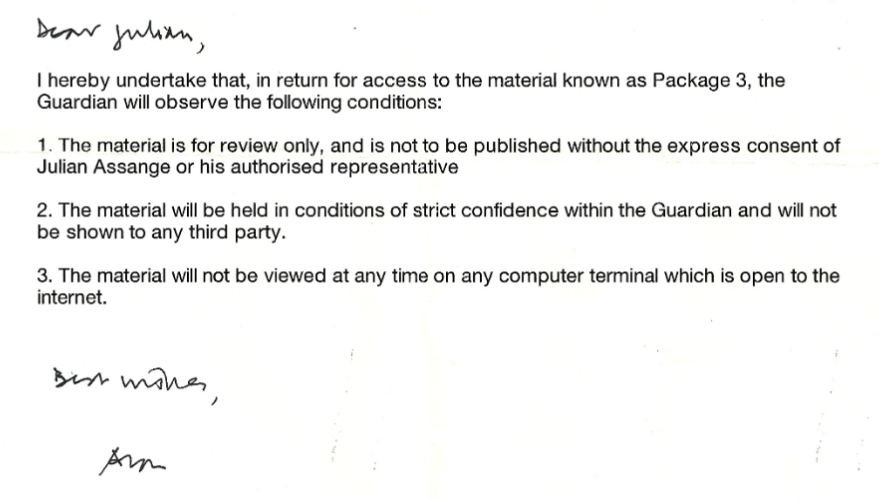
- NOTE
-
Both the Guardian and the New York Times were in financial peril in 2010 as readers flocked to online news, where advertising revenues did not cover production costs. By June 2012 the Guardian Media Group was reportedly losing £100,000 a day. The CEO’s announcement of a "digital-first" approach in 2011 was a "major transformation" largely inspired by the success of their WikiLeaks partnership. Meanwhile the New York Times moved to a paywall subscription model in 2011. The Guardian was desperate to break into the US market. These considerations would surely have figured in conversations between Rusbridger and the NYT’s EIC Bill Keller.
According to Stark and Rosenbach "the mood became somewhat more relaxed after about an hour" when lawyers had left the room and "Rusbridger opened a bottle of Chablis". Nevertheless heated discussions continued, over a restaurant dinner and more bottles of wine, till after 1 a.m. Eventually a "gentlemen’s agreement" - with no signed contracts - was reached:
Publication was not to begin before the end of November, the topics were to relate to selected countries at first and to have global significance, SPIEGEL and the Guardian were to be given access to the material, and the Guardian would sign a contract with Heather Brooke, thereby ensuring that the second copy of the cables would not present a problem… The group agreed to publish on Nov. 28, 2010, when all media organizations involved would go online simultaneously at 10:30 p.m. EST.
Julian Assange also made it clear that WikiLeaks "didn’t want to be in the front row" for this release.
"We can’t handle the entire printing. It won’t work this time. The material is too dramatic for that," he said. "We have to survive this leak."
Meanwhile, the US government was pursuing its own political strategy. This time the State Department "actually participated in the redaction process", as John Goetz recalled. In fact, State Department officials in touch with the New York Times and the Guardian were already demanding to know exactly which cables would be published. Guardian EIC Alan Rusbridger was seriously concerned that he and his staff could end up in jail:
The lawyers were quite worried saying they could lock you up they could extradite you, you could be, you know, forbidden from ever going to America, they could do you under the espionage act, they could do this, this and this.
Less than a week before the agreed publication date, Clinton’s diplomats made three concrete requests to the five major media partners (including France’s Le Monde and Spain’s El Pais) with whom they sought no quarrel:
First, they wanted the names of US government sources to be protected if leaks posed a danger to life and limb. This was a policy that all five media organizations involved already pursued. Second, they asked the journalists to exercise restraint when it came to cables with security implications. Third, they asked them to be aware that cables relating to counterterrorism are extremely sensitive. Otherwise, the officials pointed out, they had no wish to impose content restrictions on the media organizations. The official fury of the US government was directed at the presumed source, Bradley Manning, and, most of all, WikiLeaks.

*
*
The author of this book can be found on Twitter: @Jaraparilla
*
Home - Genesis - 2007 - 2008 - 2009 - Early 2010 - Mid 2010 - Late 2010 - End 2010 - Early 2011 - Mid 2011 - Late 2011 - End 2011 - Early 2012 - Late 2012 - Early 2013- Late 2013 - 2014 - 2015 - Early 2016 - Late 2016 - 2017-19
Copyright Gary Lord 2021, 2022, 2023